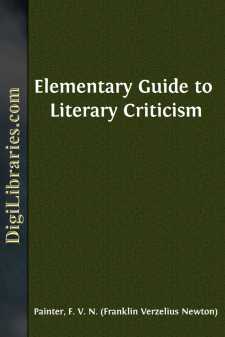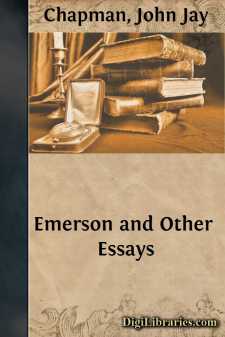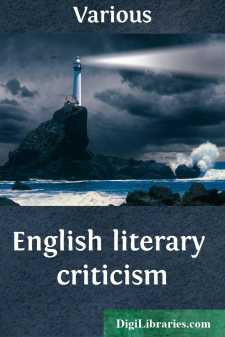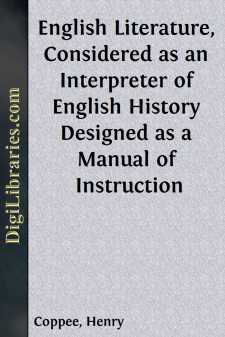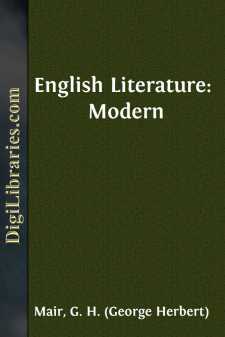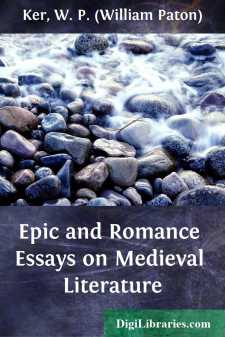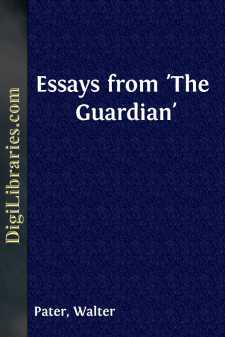Literary Criticism
- American 18
- Ancient and Classical 3
- Asian 1
- Australian & Oceanian 1
- Books & Reading 8
- Caribbean & Latin American 2
- Drama 2
- English, Irish, Scottish, Welsh 49
- European 7
- General 37
- Horror 1
- Humor 2
- Jewish 2
- Medieval 2
- Middle Eastern 3
- Poetry 7
- Renaissance 6
- Russian & Former Soviet Union 1
- Shakespeare 27
Literary Criticism Books
Sort by:
by:
Standish O'Grady
Scattered over the surface of every country in Europe may be found sepulchral monuments, the remains of pre-historic times and nations, and of a phase of life will civilisation which has long since passed away. No country in Europe is without its cromlechs and dolmens, huge earthen tumuli, great flagged sepulchres, and enclosures of tall pillar-stones. The men by whom these works were made, so...
more...
by:
Walter Crane
WALTER CRANE 1893 See handwritten text Mr Dallas's reproductions of my pen drawings for this work appear to me to be very faithful & successful in preserving the touch & general character of the originals. I have to certify that I have printed 650 copies of each of these eight subjects designed by Walter Crane, and engraved in Dallastype Facsimile by myself. Six Hundred Copies are for...
more...
CHAPTER I NATURE AND OFFICE OF CRITICISM 1. Purpose of Literary Study. The study or reading of literature ordinarily has a threefold purpose,—knowledge, pleasure, and culture. This purpose shows us both the character of the literature which should be read and the manner in which it should be read. As a rule we should read only books of recognized excellence, and read them with sympathetic...
more...
by:
John Jay Chapman
EMERSON I "Leave this hypocritical prating about the masses. Masses are rude, lame, unmade, pernicious in their demands and influence, and need not to be flattered, but to be schooled. I wish not to concede anything to them, but to tame, drill, divide, and break them up, and draw individuals out of them. The worst of charity is that the lives you are asked to preserve are not worth preserving....
more...
by:
Various
INTRODUCTION. In England, as elsewhere, criticism was a late birth of the literary spirit. English poets had sung and literary prose been written for centuries before it struck men to ask themselves, What is the secret of the power that these things have on our mind, and by what principles are they to be judged? And it could hardly have been otherwise. Criticism is a self-conscious art, and could not...
more...
by:
Leslie Stephen
When I was honoured by the invitation to deliver this course of lectures, I did not accept without some hesitation. I am not qualified to speak with authority upon such subjects as have been treated by my predecessors—the course of political events or the growth of legal institutions. My attention has been chiefly paid to the history of literature, and it might be doubtful whether that study is...
more...
by:
Henry Coppee
Chapter I. The Historical Scope of the Subject. . . . . . . . . . Literature and Science. There are two words in the English language which are now used to express the two great divisions of mental production—Science and Literature; and yet, from their etymology, they have so much in common, that it has been necessary to attach to each a technical meaning, in order that we may employ them without...
more...
CHAPTER I THE RENAISSANCE (1) There are times in every man's experience when some sudden widening of the boundaries of his knowledge, some vision of hitherto untried and unrealized possibilities, has come and seemed to bring with it new life and the inspiration of fresh and splendid endeavour. It may be some great book read for the first time not as a book, but as a revelation; it may be the first...
more...
POSTSCRIPT This book is now reprinted without addition or change, except in a few small details. If it had to be written over again, many things, no doubt, would be expressed in a different way. For example, after some time happily spent in reading the Danish and other ballads, I am inclined to make rather less of the interval between the ballads and the earlier heroic poems, and I have learned...
more...
by:
Walter Pater
[3] THE making of an anthology of English prose is what must have occurred to many of its students, by way of pleasure to themselves, or of profit to other persons. Such an anthology, the compass and variety of our prose literature being considered, might well follow exclusively some special line of interest in it; exhibiting, for instance, what is so obviously striking, its imaginative power, or its...
more...




